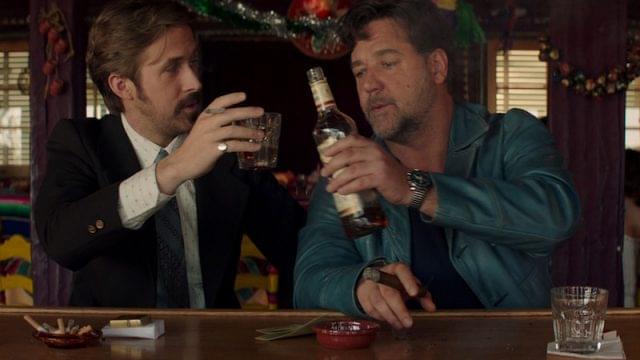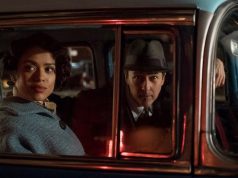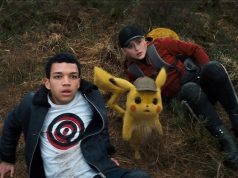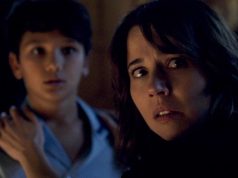
First of all, if you haven’t seen “Kiss Kiss Bang Bang,” Shane Black’s giddy deconstruction of action movies and detective fiction starring Robert Downey Jr. and Val Kilmer, stop what you’re doing immediately and watch it. Not only is it a pithy delight that you’ll be glad you saw anyway, it’s a perfect appetizer for Black’s latest film, “The Nice Guys,” a sort of spiritual sequel that shares its snappy humor and penchant for comic violence.
Or spiritual prequel, I guess, since it’s set in 1977. We meet two Los Angeles investigators, both narrating the film until they meet each other. Jackson Healy (Russell Crowe), a bloated divorcé (“Marriage is buying a house for someone you hate”) who looks like he drinks a lot but actually doesn’t, is not a licensed P.I. but a fist-for-hire. He specializes in delivering brass-knuckle messages to men who are paying undue attention to women and girls. A young lady named Amelia (Margaret Qualley) has hired him to deal with just such a man who has been following her.
Across town, there’s Holland March (Ryan Gosling): widowed father of 13-year-old Holly (Angourie Rice), licensed private investigator, and actual alcoholic. (Holly is his chauffeur a lot of the time. No one really questions it.) He’s been hired by a woman (Lois Smith) who’s looking for her niece, a porn star named Misty Mountains (Murielle Telio) who died in a car crash but who the aunt thinks is still alive. This has led March to follow someone Misty knew, a young lady named Amelia…
Once Healy and March realize they share a common interest, they work together to get to the bottom of the mystery, which unfolds with the twists of a classic noir but with more swearing, more violence, and more boobs than, say, “The Maltese Falcon.” Black’s story (he shares screenplay credit with Anthony Bagarozzi) involves a lavish party at a porn producer’s house, a missing canister of film, a high-ranking Justice Department official (Kim Basinger), a couple of thugs-for-hire (Beau Knapp and Keith David), and an assortment of colorful L.A. types.
But most importantly, it involves Healy and March — Crowe and Gosling, together at last, the comedy team we didn’t know we needed and, honestly, wouldn’t have thought would work if you’d suggested it. Out of the 40+ films Crowe has starred in, you can count the comedies on one hand. Same with Gosling, though he did some comedy in his Canadian TV days and has been funny on “SNL” and in interviews. Here, Gosling is a tornado of silliness, with a high-pitched scream, an occasional Lou Costello impersonation, and a drunkard’s sense of logic. Crowe, disheveled and paunchy without a hint of vanity, plays straight man a lot of the time, but also kills every punch line he delivers.
March’s daughter adds another interesting wrinkle to the dynamic. Smartly played by Angourie Rice in a breakout performance, Holly is March’s caretaker and protector as much as he is hers, and they’re an oddly affecting father-daughter couple. (The backstory on Mom’s absence is disappointingly underdeveloped and doesn’t amount to anything.) Holly even has rapport with her dad’s new buddy, who, like March, benefits from the influence of a precocious, uncynical child.
Like almost all of Black’s work (he wrote the original “Lethal Weapon,” you know), enjoying this requires a willingness to laugh at some dark jokes and grim violence. But it’s mixed with plenty of general-interest slapstick, wordplay, and buffoonery too, adding up to a loopy, well-assembled lark.
B+ (1 hr., 56 min.; )





